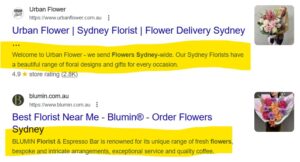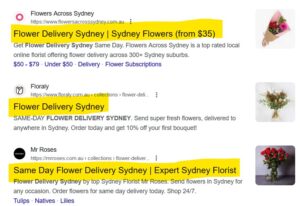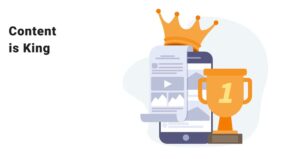Home » Creating Meta Descriptions
Creating Compelling Meta Descriptions: A Guide to Enhancing Your SEO
 Meta descriptions are HTML attributes that provide concise summaries of web pages. They appear under the page title in search engine results pages (SERPs) and serve as a marketing pitch to entice users to click through to your website. See what Google has to say about meta descriptions.
Meta descriptions are HTML attributes that provide concise summaries of web pages. They appear under the page title in search engine results pages (SERPs) and serve as a marketing pitch to entice users to click through to your website. See what Google has to say about meta descriptions.
Crafting effective meta descriptions is essential for improving your website’s visibility and click-through rates (CTR). In this article, we’ll explore the importance of meta descriptions and offer practical tips for creating compelling ones.
Do you need help writing meta descriptions for your website? Optimal Web Design offers affordable SEO packages to help your business achieve the results you are after and we take care of all of this for you.
What is a Meta Description?
A meta description is a brief, informative summary of a webpage’s content, typically ranging from 150 to 160 characters. While not a direct ranking factor for search engines like Google, a well-written meta description can influence users’ decisions to click on your link over others. It is an important part of SEO.
Why Are Meta Descriptions Important?
-
Improved Click-Through Rates (CTR): A compelling meta description can significantly increase the likelihood of users clicking on your link. It serves as an advertisement for your content, highlighting its value and relevance.
-
Enhanced Visibility: Meta descriptions that effectively use targeted keywords can help search engines understand the content of your page, although they do not directly impact rankings. When keywords match a user’s search query, they may appear bolded in the SERPs, catching the user’s eye.
-
User Experience: A well-crafted meta description provides users with a clear idea of what to expect from your page. This transparency can lead to more satisfied visitors, reducing bounce rates.
Tips for Writing Effective Meta Descriptions
-
Keep It Concise: Aim for a length of 150 to 160 characters. This ensures your description is fully visible in search results without being truncated.
-
Incorporate Target Keywords: Include relevant keywords naturally within your description. This not only improves SEO but also helps users quickly identify the relevance of your content to their search.
-
Be Descriptive and Specific: Clearly describe what the page is about. Highlight the main points or unique selling propositions that will attract users’ attention.
-
Use Action-Oriented Language: Encourage users to take action by using strong verbs. Phrases like “Discover,” “Learn,” or “Get Your Free Quote” can create a sense of urgency and entice clicks.
-
Make It Unique: Each page on your website should have a distinct meta description. This avoids duplication and helps search engines and users understand the unique value of each page.
-
Focus on the User’s Intent: Consider what users are searching for when they arrive at your page. Tailor your description to align with their needs and motivations, ensuring it resonates with your target audience.
-
Include a Call to Action: If appropriate, add a call to action to guide users on what to do next. This could be visiting your site, signing up for a newsletter, or checking out a product.
-
Avoid Keyword Stuffing: While it’s important to include keywords, overloading your description can make it sound unnatural and uninviting. Aim for a smooth and engaging read.
Examples of Effective Meta Descriptions
-
E-commerce Product Page: “Shop the latest stylish summer dresses at [Brand Name]. Discover unique designs and enjoy free shipping on orders over $50!”
-
Blog Post: “Unlock the secrets to successful blogging! Explore our top 10 tips to create engaging content and grow your audience today.”
-
Service Page: “Need reliable plumbing services in Melbourne? Our licensed plumbers are ready to assist you 24/7. Get a free quote now!”
-
Landing Page: “Transform your home with our expert interior design services. Schedule a consultation and start your journey to a beautiful space today!”
Tools for Optimising Meta Descriptions
-
Yoast SEO: This popular WordPress plugin provides real-time feedback on your meta descriptions and overall SEO practices.
-
Google Search Console: Use this tool to monitor how your pages perform in search results and identify opportunities for improvement.
-
SEMrush: A comprehensive SEO toolkit that can help you analyse competitors’ meta descriptions and keyword usage for inspiration.
Conclusion
Creating effective meta descriptions is a vital component of your SEO strategy. By focusing on concise, descriptive, and action-oriented content, you can enhance your website’s visibility, improve click-through rates, and attract more visitors. Regularly review and optimise your meta descriptions to ensure they align with your current content and target audience’s needs. With thoughtful crafting, quality meta descriptions can significantly contribute to your website’s overall success.




